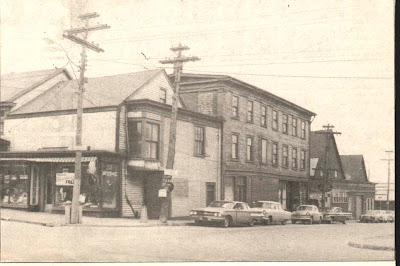November 25, 1979
The Novels That Got Away
By MARY MCCARTHY

I stayed at the traveling salesmen's hotel (the hotel accommodation, I think) and rode up in the elevator and down three times a day to the dining room, where I was eyed without much curiosity by the salesmen with their cases of samples at nearby tables. I spoke to nobody, and nobody spoke to me. After a single frightening foray into the businesslike streets in search of the harbor, which I never found, I stayed all day long in my room like a prisoner sentenced to the typewriter. The room was made up while I was below, eating; the waiter brought me my food with scarcely a look or a word. My sole terse exchanges were with the bank clerk who changed my money and a the postal employee who took my telegram when I nerved myself to go out a second time in order to plot my escape.
By a turn of poetic justice, this became my own lost week.
 |
| Uninspiring Yarmouth |
On my return, no one, I discovered, believed that I had gone all that way to
Six or seven years later, in
But almost at once a disagreeable duty imposes itself. She must find an open drugstore and shut herself up in a phone booth to call her lover. He will still be in bed, of course, soggy with sleep, eyelids gummy, voice rheumy and thick. "Honey," he wheedles, sounding plaintive but nonetheless appeasing. She is repelled, as she is every morning when she has to wake him. But if she does not call him now, it will be too late. She cannot do it from her apartment; her husband is there. She has only this quarter of an hour. Often, as today, she is tempted to forgo letting him know when she will be free; she can put her nickel back into her coin purse and go home. But generally she exerts her will, forcing herself to drop the coin and not to be irritated when he answers. If only he could be up one morning, just to please her. He knows the burden is on her because he must not call her at home.
Yet why does she go through with this chore? It is a mystery to her. Maybe because it is a chore, like cleaning the oven, and she feels duty-bound, as a good person, to conquer her aversion. When she is with him, across a lunch table or in his (still) unmade bed, after a while it wears off. But why must she have a lover at all? He is her first, and yet he has become chronic, like a habit.
The manuscript breaks off in the phone book, that is, at the familiar lowest moment of Mrs. Harold Husted's day: no more ribbon of newness. Looking back, I think I see why I could not go on. This pitiful cramped version of the eternal triangle is too abstract, too neoclassical, to make a novel. We do not need to know more about the lover or about Mr. Harold Husted, the husband who for some plausible or implausible reason will still be at home at 9 o'clock in the morning. All we need to know has already been told. Actually this is a short story that should have ended (where it did) in the phone booth. If a student gave me the manuscript, I would tell her that. But I also see something that a teacher of writing would not have been able to guess. Clearly, this fragment is a foreshadowing of "The Group." Though little Mrs. Husted's story does not appear there, her anxious but game spirit has carried over.
 |
| Bette Davies Reconstructs |
No comments:
Post a Comment